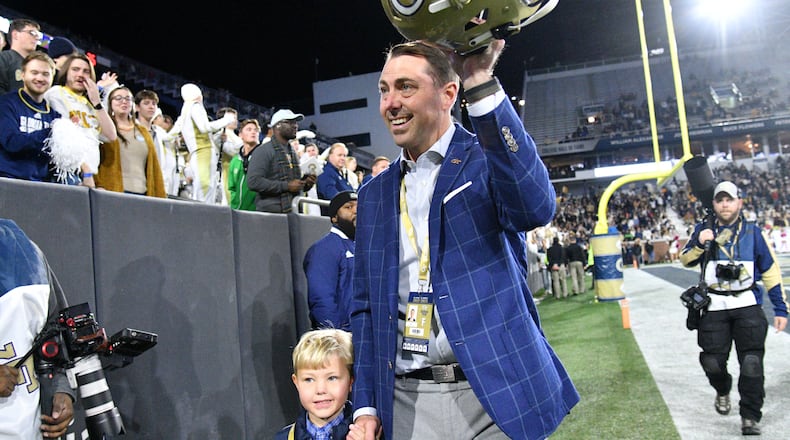Georgia Tech athletic director J Batt was a guest on a recent episode of Bloomberg’s ”The Deal with Alex Rodriguez and Jason Kelly” podcast.
Batt spoke with Kelly, an Atlanta native who said his father attended Tech, and Rodriguez for a discussion centered on the business side of college athletics.
Here are some highlights from that discussion:
How do you begin to get a handle on the sweeping changes in college athletics?
“I’d say you gotta start with what’s still the same, right? What’s still the same is we still got great kids. We have great coaches. We’re still attached to really, really incredible academic institutions. And I can speak firsthand at Georgia Tech — our kids still go to class and get degrees. The student-athletes that we deal with, they’re still student-athletes.
“What’s changing is this sort of overlay of the changing business of college athletics. We were one of the first folks to go out and hire what amounts to a general manager. We’ve got the proliferation of agents; our student-athletes, many of them have agents. Well, there needs to be a person to deal with that. We’re gonna have these rev (revenue) share payments to be paid to student-athletes, you’ve gotta have a business operation on your internal side to handle that. And sure as heck you gotta have a whole bunch of legal help to manage that.
“And then I think just the talent you have to surround yourself with. It’s not the same as it was 10-15 years ago. Whether it’s the athletic director chair needed more business acumen, more ability to manage a larger budget, all that’s really important, still anchored in the fact that college athletics is essential to the fabric of higher education. It’s essential to what it means, not for student-athletes only, but for every student. There’s such value to the overall student experience to what college athletics brings.”
How to build rosters with traditional students versus transfer students:
“I think there’s going to be less and less separation across the overall landscape, as far as what one student-athlete, a certain profile might be from any given institution to the other, as there’s a new revenue-sharing number that’s kind of ubiquitous across all of the institutions.
“I think a high academic institution like Georgia Tech, in a thriving major metro like Atlanta, where real third-party NIL deals will be highly valued and available, with an alumni network that will make a difference when you finish — that’s gonna go back to being important.
“There was a time when maybe that didn’t factor as much. You saw institutions pause facility projects. You saw folks say, ‘Hey, we’re not gonna go and hire some new coach, we’re gonna make an investment in NIL.’ As we move into the next era, some of that spread is gonna tighten up. And I think what you will see is we’re gonna go back to a place where an opportunity to come to Georgia Tech, graduate with that degree, that’s gonna matter maybe more than maybe it has in the past three, four, five years.”
What has been the goal in being part of the settlement implementation committee (a group comprised of officials from the ACC, Big Ten, Big 12, Pac-12, SEC and NCAA tasked with executing the new model for overseeing college athletics following the House v. NCAA settlement)?
“I think the desired outcome of that is let’s have something that’s stable, let’s have something that’s clear, let’s have something that we can operate within going forward that will provide us that clarity and stability for student-athletes to gain more. At the end of the day, there’s never been a better time to be a student-athlete.
“We’ll have this (revenue sharing) pool. We’ll have the ability for student-athletes in an organized system to earn third-party NIL deals. There’ll be more scholarships. You see headlines all the time of athletic departments adding huge amounts of scholarships and opportunities. And we’ll continue to offer all the benefits that we always have, whether it’s the medical coverage, whether it’s the academic support. All those parts and pieces that go with it. There’s just gonna be on top of all those things that we’ve already been doing. I think that’s probably the biggest takeaway, is that we’re building that system. It’s a bunch to figure out and a bunch to sort through, but I think we’re building something that is sustainable.”
What are your best practices for raising capital?
“I think the most important thing is to value, and constantly work on, genuine relationships. I think it’s often forgotten that, ‘My value prop or my business plan is so good that, of course, someone’s gonna buy this or invest in this or give us money because, my goodness, we’re winning games or we wanna win games or whatever it might be.’ People give to people. People invest in people.
“Being available, being part of that, investing in those relationships — so that when the time comes for that ask, it’s not the first thing you’ve heard of ‘em. It’s important to be there. That genuine relationship I found to be huge.”
How much do sports factor into fundraising?
“I can’t tell you how many fundraising conversations start with, ‘I remember the Miracle on Techwood when Georgia Tech beat Florida State (in 2015) …’ That shared experience ties together alums to the institution.”
About the Author
Keep Reading
The Latest
Featured


